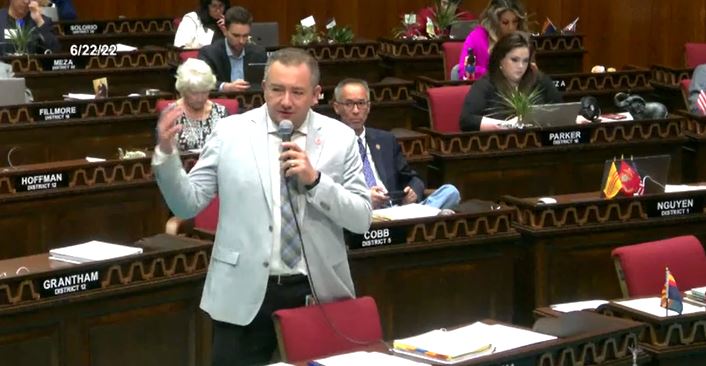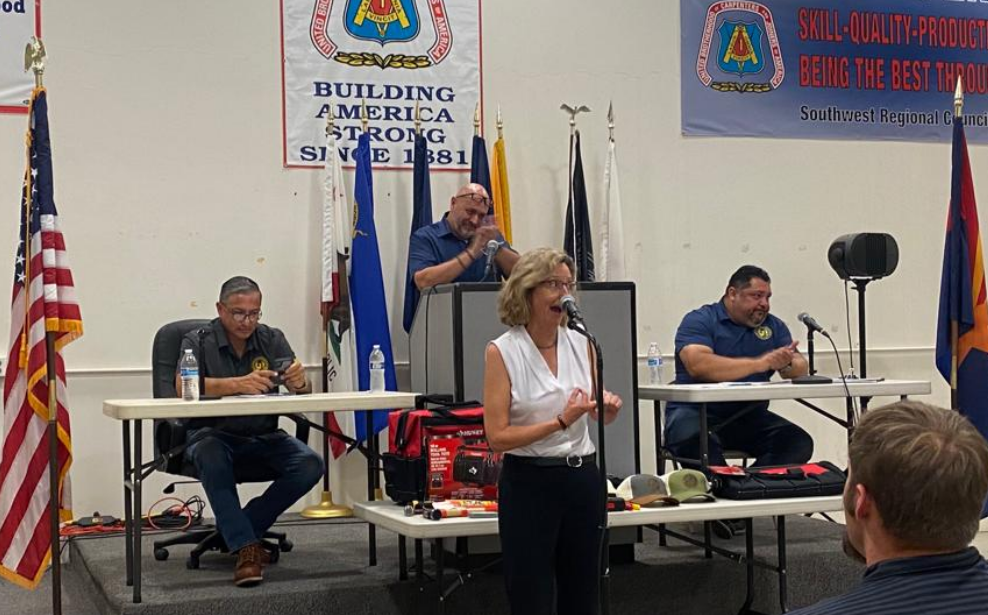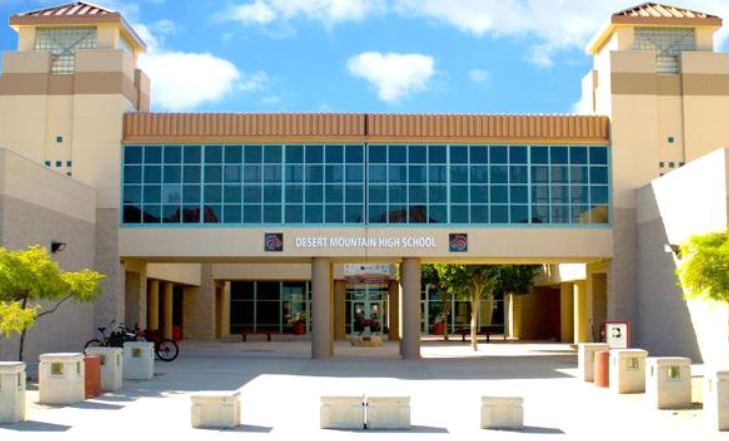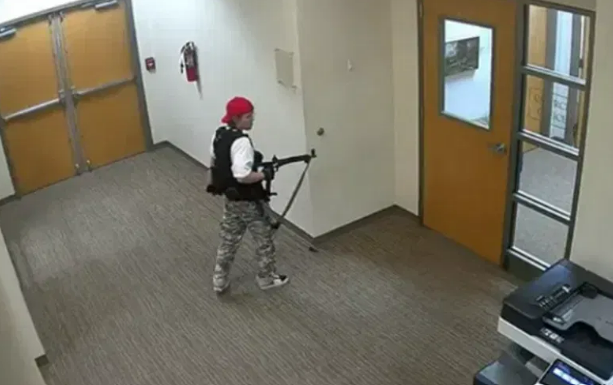
by Daniel Stefanski | Nov 9, 2023 | News
By Daniel Stefanski |
Arizona’s Republican legislative leaders are wading into another fight with the President of the United States over a recent federal land grab.
On Monday, Arizona Senate President Warren Petersen and House Speaker Ben Toma announced that they “filed an amicus curiae in the case of Garfield County v. Biden.” The case, led by Utah Attorney General Sean Reyes, involves President Joe Biden’s “unilateral move in 2021 of declaring more than 3 million acres of land in the southern part of the state now representing two ‘national monuments.’” Arizona’s leaders are supporting the State of Utah’s position that the president’s action here violates the Antiquities Act. After a District Court Judge sided with the White House, Utah appealed the decision, leading to additional briefing.
“It is time for the courts to weigh in and stop this federal corruption. Joe Biden’s unlawful maneuvers in both Utah and Arizona promise to wreak havoc on our local economies, the livelihoods of our citizens, and our national security. His end goal is to pander to radical environmentalists by ending mining, ranching and other local uses of federal lands. This has nothing to do with protecting actual artifacts,” said Senate President Petersen. “This federal overreach is unconstitutional, unacceptable, and sets a dangerous precedent. In the absence of Arizona’s Attorney General fighting back against Biden’s dictator-style land grabs, the Arizona Legislature is stepping up to protect our communities. We ultimately anticipate this issue will make its way to the U.S. Supreme Court where the president’s abuse of power will be reined in.”
In their brief, Petersen and Toma argue that “the President does not have discretion to declare anything an ‘object’ under the Antiquities Act” because the law “is a type of conditional legislation that limits the President to ascertaining whether something is objectively an object of historic or scientific interest” and “Constitutional concerns underscore the need to limit the President’s discretion under the Act.” The legislators also assert that “Courts are not powerless to stop the President’s clear abuses of power.”
The lawmakers make the case that “the power that the President claims here is an expansive and aggressive assertion of executive authority. If his reading of the Antiquities Act is right, the only thing preventing the President from declaring all federal land a national monument is his self-restraint; after all, all federal lands have landscapes that, according to President Biden, are an ‘object of historic or scientific interest…’ Such a power, with its attendant consequences for the use of the land, is plainly one ‘of vast economic and political significance.’”
The case is currently before the United States Court of Appeals for the Tenth Circuit.
Daniel Stefanski is a reporter for AZ Free News. You can send him news tips using this link.

by Daniel Stefanski | Nov 9, 2023 | News
By Daniel Stefanski |
On Monday, the U.S. Attorney’s Office for the District of Arizona announced that it had arrested a Tempe man this past weekend “on a federal complaint and arrest warrant by the Federal Bureau of Investigation for making a threat to execute a local Rabbi and ‘every other JEW [sic] I can find tonight at midnight of your Sabbath.’”
According to the press release from the U.S. Attorney’s Office for Arizona, “the complaint alleges that (the Tempe man) sent an email on the morning of Friday November 3, 2023, to a Rabbi at a local synagogue in Scottsdale, asking the Rabbi to ‘try to convince’ a judge in Utah to ‘drop the charges against’ (him) in a state district court case in Utah. The email stated: ‘If you do not use your influence to right this wrong I will execute you and every other JEW [sic] I can find tonight at midnight of your Sabbath.’ The email went on: ‘If you wish to communicate with me further, I will only meet in person,’ listed an address for the sender in Tempe, and was signed ‘Shalom, Viktor Sitkevicz.’”
United States Attorney Gary Restaino issued a statement in conjunction with the announcement, saying, “Civic engagement and civil dialogue help bind us together as a Nation. We have no tolerance for those who send threatening communications to Jewish faith leaders or to any other people in America. We will continue to exercise our prosecutorial discretion and deploy our resources to charge threats cases here in Arizona.”
The acting special agent in charge of the FBI’s Phoenix field office, Chad Alvarado, added, “The FBI takes all threats of violence seriously. The FBI and our law enforcement partners must take people who make threats at their word and intervene, because protecting human life is our absolute priority.”
In the release, the U.S. Attorney’s Office for Arizona credits the FBI for conducting this investigation and the Tempe Police Department and the Maricopa County Sheriff’s Office for assisting.
Daniel Stefanski is a reporter for AZ Free News. You can send him news tips using this link.

by Corinne Murdock | Nov 8, 2023 | News
By Corinne Murdock |
Democratic congressional candidate Kirsten Engel has confused which district she’s running in, marking the second year and second congressional race in a row of similar oversights to the district she aims to represent.
On Tuesday, Engel posted about her weekend activities purportedly in the sixth congressional district — except, all of the events took place in the seventh congressional district.
“Busy weekend in #AZ06!” said Engel.
The canvass with Tucson Mayor Regina Romero took place at the mayoral candidate’s headquarters — 2720 E. Broadway Blvd, Tucson, AZ 85716. The tailgate for the University of Arizona (UArizona) Homecoming took place at the University of Arizona Mall (85721). The UArizona Law awards ceremony granting Rep. Ann Kirkpatrick the Lifetime Achievement Award took place at the James E. Rogers College of Law — 1201 E Speedway Blvd, Tucson, AZ 85721.
None of those events were in the sixth congressional district.
The National Republican Congressional Committee (NRCC) was among the first to notice Engel’s mistake. NRCC spokesperson Ben Petersen said in a statement that Engel’s oversight amounted to disrespect — especially since she made a similar mistake last year.
“Extreme liberal Kirsten Engel refuses to stop disrespecting 6th district voters. The 7th Congressional District is as close as Engel will come to representing the 6th, especially given she can’t find it on a map,” said Petersen.
In July, Engel claimed she was mobilizing her local grassroots support and hearing the concerns of voters within her district — yet posted a picture from the Bisbee Pride Parade, which is outside of the district.
“It’s been an exhausting but exhilarating first couple of months on the campaign trail,” said Engel. “I’ve loved traveling throughout Cochise, Graham, Greenlee, Pima, and Pinal counties — talking to voters, hearing their concerns, and mobilizing grassroots support.
Engel faced a similar issue with district engagement and recognition last year.
Last September, while running against now-Rep. Juan Ciscomani for the sixth district, Engel held a campaign event at Hotel Congress in downtown Tucson — outside the sixth district — immediately after skipping a debate with Ciscomani.
Several months prior, the Arizona Daily Independent reported that Engel and her primary opponent Daniel Hernandez opted to host their debate outside the sixth district as well.
Corinne Murdock is a reporter for AZ Free News. Follow her latest on Twitter, or email tips to corinne@azfreenews.com.

by Corinne Murdock | Nov 8, 2023 | Education, News
By Corinne Murdock |
A UNICEF club at Desert Mountain High School (DMHS) allegedly told meeting attendees to side with Hamas in the ongoing Israel-Palestine conflict. Hamas is a terrorist group and the de facto governing entity of the Gaza strip, the heart of the ongoing conflict.
In images posted to X (formerly Twitter), the club declared that Israel was an apartheid state, desired to eradicate Muslims, and was the aggressor in the ongoing conflict.
Specifically, the club declared that Israel has been illegally occupying, taking, and settling on land belonging to Palestinians; that Israel had engaged in ethnic cleansing and apartheid by forcibly displacing and discriminating against Palestinians; and that Israel unjustly tortured and imprisoned Palestinians, including 80 percent of Palestinian children.
The club also notified club members of an upcoming fundraiser to submit proceeds to UNICEF Gaza, and plans to reroute Halloween fundraising funds to Gaza and the Palestine Children’s Relief Fund.
A candidate for Arizona Department of Education Superintendent, Shiry Sapir, said that the meeting was an endangerment to Jewish students by issuing a false representation of the Israel-Palestine conflict escalated last month by the terrorist organization Hamas.
“Remind [DMHS] that publicly funded schools aren’t supposed to partake in propaganda and anti-Semitic rhetoric,” said Sapir.
Sapir urged district leadership to implement a preemptive plan to prevent retaliation against Jewish students, and for a representative of Israel come to speak at the school to the students present at the UNICEF club meeting.
Sapir learned of the incident after receiving a report from a parent, who also reported filing a complaint with the school about the club meeting.
“I wish [my daughter] took pics or video but she said all they spoke about was how Israel is the aggressor and Jews want to kill all Muslims,” said the parent. “How Israel took the land illegally and is committing war crimes. Craziest propaganda.”
The principal, Lisa Hirsch, said in a letter to the DHMS community that she reviewed and approved the slide content before the club meeting. Hirsch emphasized that school clubs were optional and intended to be safe spaces that foster inclusivity. However, she noted that school officials would be reviewing club meetings to ensure content aligned with principles of free speech and mutual respect.
“We are dedicated to promoting an environment that encourages open dialogue, the sharing of diverse perspectives, and constructive conversations while respecting the rights and values of every member of our school community,” said Hirsch.
There are four other UNICEF high school clubs in Arizona in addition to DMHS: Basis Chandler High School, Basis Scottsdale, Basis Peoria, and Hamilton High School.
Corinne Murdock is a reporter for AZ Free News. Follow her latest on Twitter, or email tips to corinne@azfreenews.com.

by Corinne Murdock | Nov 8, 2023 | News
By Corinne Murdock |
Former assistant attorney general Jen Wright questioned the location of videos made by the Nashville, Tennessee school shooter, as identified in the manifesto leaked Monday.
Wright drew attention to a detail in one of the manifesto pages, obtained exclusively by conservative pundit Steven Crowder through “Louder With Crowder.” That page detailed shooter Aiden (nee Audrey) Hale’s proposed “Death Day” schedule — the day where she would take the lives of three children and three faculty members at The Covenant School.
“11:20 am – Final Video Tape (10 min),” read the schedule.
However, Hale deviated from the leaked manifesto schedule. She entered The Covenant School shortly after 10 am. The other two leaked manifesto pages were dated Feb. 3, 2023 and March 27, 2023, the latter dated for the day of the shooting.
The reasons for Hale’s massacre have largely been up for speculation, due to law enforcement’s refusal to release Hale’s writings.
The former page from February, titled “Kill Those Kids,” appeared to be a poem of sorts expressing her hatred for white, well-off children. Hale had attended The Covenant School herself.
“Kill those kids!!! Those crackers going to private fancy schools with those fancy khakis [and] sports backpacks [with] thier [sic] daddies mustangs [and] convertables [sic]. F**k you little s***s[;] I wish to shoot you weaka** d***s [with] your mop yellow hair[.] Wanna [sic] kill all you little crackers!!! Bunch of little f*****s [with] your white privlages [sic] [;] f**k you f*****s[.]”
In the latter page from the day of the shooting, titled “Dark Abyss: Death Day,” Hale expressed the hope that she would kill many people, and issued a prayer of sorts to God to help her kill. Hale referenced a time in 2021 when she was nearly “caught” planning a mass shooting. More information on that detail has not surfaced.
“Today is the day. The day has finally come! I can’t believe it’s here. Don’t know how I was able to get this far, but here I am. I’m a little nervous, but excited too. Been excited for the past 2 weeks. There were several times I could have been caught, especially back in the summer of 2021. None of that matters now. I’m almost an hour [and] 7 minutes away. Can’t believe I’m doing this, but I’m ready… I hope my victims aren’t. My only fear is if anything goes wrong. I’ll do my best to prevent any of the sort. (God let my wrath take over my anxiety). It might be 10 minutes tops. It might be 3-7. It’s gunna [sic] go quick. I hope I have a high death count. Ready to Die. Haha. Aiden.”
The leaked manifesto pages represent just three of many others that have yet to be released by law enforcement. As journalists have pointed out, law enforcement seized up to 20 journals, a suicide note, other miscellaneous notes, a psychiatric/medical folder, three home videos, several cell phones, multiple computers and hard drives. None of these other materials have been released.
Hale was a woman who identified as a transgender man.
Nashville Mayor Freddie O’Connell has ordered an investigation into the origin of the leak.
Corinne Murdock is a reporter for AZ Free News. Follow her latest on Twitter, or email tips to corinne@azfreenews.com.

by Daniel Stefanski | Nov 7, 2023 | News
By Daniel Stefanski |
A school bus driver in an Arizona town was arrested for alleged smuggling activity.
Last week, the Chief Patrol Agent of the U.S. Border Patrol’s Tucson Sector, John R. Modlin, posted to “X” that “the Brian A. Terry Station Field Training Unit arrested a U.S. citizen, (who was) caught smuggling migrants inside a bus in Naco, Arizona.”
Chief Modlin added that “vigilant border camera operators played a crucial role in this apprehension after observing suspected migrants enter the bus.”
American citizens play a significant role in cross-border human and drug trafficking. A CATO Institute study in September 2022 found that “over ninety percent of fentanyl seizures occur at legal crossing points or interior vehicle checkpoints, not on illegal migration routes, so U.S. citizens (who are subject to less scrutiny) when crossing legally are the best smugglers.”
In 2019, the Washington Post reported that “more than sixty percent of people convicted of smuggling in federal courts in recent years have been U.S. citizens, the majority of them with little or no criminal history, according to the U.S. Sentencing Commission.” The report added that “U.S. citizens are pulled into smuggling through word of mouth and social media”…and that “smugglers have been recruited by relatives, spouses and friends – even their bosses at work – and typically communicate via cellphone with the migrants and their guides in Mexico.”
Cochise County Sheriff Mark Dannels and former Arizona Attorney General Mark Brnovich warned of the dangers posed to American teenagers, who are highly sought-after targets by cartels and smugglers for illegal couriering activities. In a 2022 op-ed for Fox News, the two officials wrote that “drug cartels are now using SnapChat, Instagram, and other social media apps to recruit American teenagers from around the country to transport migrants and drugs from the border,” and that “high-speed pursuits between these teenagers and local law enforcement have become daily events.”
The two officials concluded their piece by sounding the alarm about the reality on the ground, saying, “As law enforcement officials in our state, we can say with full confidence that we have never seen anything like this crisis at the border and how it is affecting everyday Americans in their communities. While many media outlets have declined to show the American public the disturbing images of increasing high-speed pursuits and other border-related devastation here at home, the death and danger they present are very real; lives are at stake.”
Daniel Stefanski is a reporter for AZ Free News. You can send him news tips using this link.






